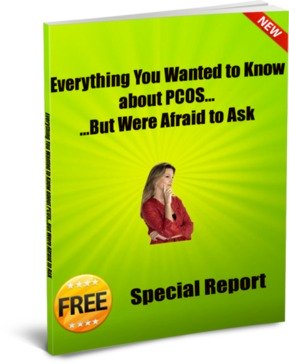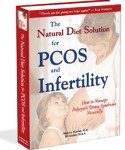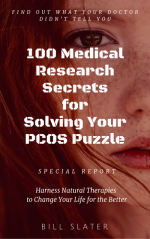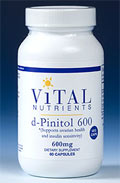PCOS Review Newsletter #20
1) Hate Your Hair? Blame Your Mother's Diet
3) PCOS and Fibrocystic Breast Disease
1) Hate Your Hair? Blame Your Mother's Diet
In a study that demonstrates you are what you eat, scientists have reported they have changed the fur colors of baby mice simply by altering their mothers' diets.
They changed the color of baby mouse fur by feeding pregnant mice four nutritional supplements -- vitamin B12, folic acid, choline and betaine. Mice given the supplements gave birth to babies with predominantly brown coats. Pregnant mice not fed the supplements gave birth mostly to babies with yellow coats.
There is a wide range of supplemental nutrients that can help you alleviate symptoms of PCOS (polycystic ovarian syndrome) and reduce the incidence of ovarian cysts. Nutritional supplements are vital for your health but every person has somewhat different needs. We have spent years researching and identifying the best solution for each problem. Visit Supplements Guidelines for guidance on which nutritional supplements may be appropriate for you.
The study shows that common nutrients can influence which genes turn on and off in a developing fetus, and help explain some of the factors that decide which genes are expressed and which remain silent.
The researchers noted, "We have long known that maternal nutrition profoundly impacts disease susceptibility in their offspring, but we never understood the cause-and-effect link…For the first time ever, we have shown precisely how nutritional supplementation to the mother can permanently alter gene expression in her offspring without altering the genes themselves."
There is much support for the idea that nutrition can affect gene expression in people. Several studies have shown, for example, that women who eat a poor diet while pregnant have children who grow up with a tendency to diabetes and heart disease.
In this mouse study, the gene affected by the supplements was the Agouti gene. This gene affects more than fur color. Mice with overactive Agouti genes tend to be obese and susceptible to diabetes.
The supplements had the effect of turning the Agouti gene "off" so that it could not exert its influence on the embryonic mice. The result was that the baby mice had a different color fur for the rest of their lives. Turning off the Agouti gene during pregnancy also causes the mice offspring to be less prone to obesity and diabetes.
Bottom Line: 1. What you eat will profoundly influence your future health. 2. What your mother ate with you in her womb has profoundly influenced your past and present health -- and will influence your future health. 3. If you plan to become a mother, what you eat at conception and during early pregnancy will profoundly influence your child's future health.
We bring this study to your attention because it illustrates that what you put into your mouth is crucial in determining how your genes behave. Improving your diet is arguably the most important thing you can do to change the outcome of your health problems. Of course, your diet will have tremendous implications for your own future children. The issue of what to eat and drink is so important that we are writing a diet book specifically for women with PCOS and infertility problems. See: PCOS Diet book.
Source: Waterland RA et al, Transposable Elements: Targets for Early Nutritional Effects on Epigenetic Gene Regulation, Molecular and Cellular Biology, August 2003, 23(15):5293-5300
2) Accutane Update
A considerable number of women with PCOS have acne. In serious cases, a doctor may prescribe Accutane (isotretinoin). Read this if you're taking Accutane and are trying to conceive or are pregnant.
The FDA has said that Accutane and its generic versions will face tighter prescription controls to prevent harm to unborn children. Accutane can cause fetuses to die or develop birth defects. FDA officials are concerned about women who become pregnant while taking the drug.
Under a new FDA monitoring program, manufacturers must keep track of doctors who prescribe the drug, pharmacies that distribute it and patients who take it. Doctors and pharmacies must inform patients about the drug's risks, get their informed consent, and obtain proof of negative pregnancy tests before giving the drug to women.
3) PCOS and Fibrocystic Breast Disease
We recently came across a study conducted at the University of Rome, Italy that showed an association between polycystic ovary syndrome and fibrocystic breast disease (FDB), based on ultrasounds of the pelvis and breasts. According to the ultrasound findings, only 6.8% of women with normal ovaries had breast pathology, whereas 57% of those with polycystic-appearing ovaries had breast pathology. Worst of all, 91% of those with polycystic ovary syndrome also had breast pathology. None of the women were using oral contraceptives.
Fibrocystic breast disease is a condition where both breasts become tender or painful, and lumpy. The roundish lumps can be soft or firm, move freely within the breast tissue and are tender to the touch. The intensity of symptoms may vary with the menstrual cycle. Standard treatment is pain relievers or possibly birth control pills.
Fibrocystic breasts may improve if you avoid caffeine and reduce fat intake, especially saturated fats. Also recommended is a high-fiber diet, with an emphasis on plant-based foods. A diet high in refined "convenience" foods can worsen the condition. An increase in seafood is also recommended. Fish in particular may be useful in preventing breast cysts due to their iodine content and the healthy omega-3 oils they contain. Pharmaceutical grade product can also serve the purpose.
Regular exercise is also helpful.
Fibrocystic breast disease has been linked to excess estrogen and prolactin. It should be noted that women with PCOS also often have elevated estrogen and prolactin.
There are a number of nutritional supplements that may relieve fibrocystic breast disease. However, you should consult with a licensed naturopathic physician or medical doctor who understands the use of supplements. The type and amount of dietary supplements you may need depend on your unique, individual health status.
The herb Vitex or its standardized extract may help to relieve fibrocystic breast disease. It is also useful for PCOS. Vitamins A, B-complex and E may be mildly helpful.
Thousands Of Women - Just Like You - Have Overcome The Negative Effects of PCOS By Following The Advice in Our 490-Page PCOS Diet eBook. Visit our PCOS Diet eBook page to download your copy today.
Sources: D'Amelio R et al, Association between polycystic ovary and fibrocystic breast disease, Gynecol Obstet Invest, 2001, 51(2):134-7
PCOS Health Review
This free newsletter gives you original and immediately usable information to help you deal with PCOS.
Get the latest research, tips for improving your health, answers to questions, success stories, and more!
Your e-mail address is totally secure. We will never misuse your information.
Enter Your Email Above to Subscribe Today
and Get Your Questions Answered in this Free Special Report!





